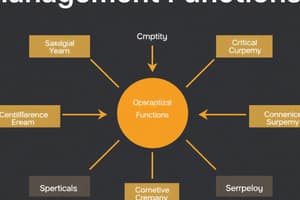Podcast
Questions and Answers
What is the primary purpose of the planning function in management?
What is the primary purpose of the planning function in management?
- To monitor employee performance and outcomes
- To set objectives for the organization for a future period (correct)
- To assign tasks and responsibilities to employees
- To hire and train new staff for the organization
Which type of manager is primarily responsible for organization-wide decisions?
Which type of manager is primarily responsible for organization-wide decisions?
- Middle Managers
- Top Managers (correct)
- First-Line Managers
- Operational Managers
In which managerial role does a manager act as a representative of their unit to the outside world?
In which managerial role does a manager act as a representative of their unit to the outside world?
- Entrepreneurial Role
- Figurehead Role (correct)
- Monitor Role
- Spokesperson Role
Which role focuses on connecting with other units within and outside the organization?
Which role focuses on connecting with other units within and outside the organization?
What is the function of controlling in management?
What is the function of controlling in management?
What is the primary focus of management in relation to organizational goals?
What is the primary focus of management in relation to organizational goals?
Which statement best describes 'efficiency' in the context of management?
Which statement best describes 'efficiency' in the context of management?
Which process is NOT considered a function of management according to Koontz and O'Donnel?
Which process is NOT considered a function of management according to Koontz and O'Donnel?
How is management characterized as an art?
How is management characterized as an art?
What distinguishes management as a science?
What distinguishes management as a science?
Flashcards are hidden until you start studying
Study Notes
Management Functions
- Planning: Setting objectives for the future of the organization, deciding on a course of action, and allocating resources to accomplish tasks.
- Organizing: Grouping activities into logical units, assigning responsibility for those activities, and establishing a hierarchy of authority.
- Staffing: Recruiting, selecting, training, and developing employees along with managing the organization’s workforce.
- Directing: Leading and motivating employees to achieve the organization’s objectives.
- Controlling: Monitoring performance, taking corrective action as needed, and ensuring that the set objectives are met.
Types of Managers
- First-Line Managers: Directly supervise non-managerial employees.
- Middle Managers: Responsible for overseeing and coordinating activities within departments.
- Top Managers: Set the overall direction of the company and make strategic decisions.
Types of Roles of Managers
Interpersonal Roles
- Figurehead: Representing the unit in the outside world (e.g., attending social events, dealing with media).
- Leadership Role: Initiating and coordinating activities within the unit.
- Liaison Role: Connecting with other units within and outside the organization to establish and maintain relationships.
Informational Roles
- Monitor Role: Gathering information from various sources within and beyond the organization.
- Disseminator Role: Communicating information to relevant individuals within the organization.
- Spokesperson Role: Representing and communicating the unit's position to different stakeholders.
Decisional Roles
- Entrepreneurial Role: Identifying new opportunities and initiating activities to exploit them.
- Problem Solver: Handling unexpected problems and crises.
- Resource Allocator: Distributing resources effectively across different activities.
- Negotiator: Facilitating negotiations with various stakeholders to achieve the best outcomes for the unit.
Management as a Science vs. an Art
- Science: A set of theories, concepts, and principles that provide a structured approach to management.
- Art: Involves the practical application of management knowledge, requiring creativity and adaptability.
Management Skills
- Technical Skills: Expertise in specific techniques, methods, and procedures.
- Human/Interpersonal Skills: Ability to work effectively with others, build relationships, and motivate teams.
- Conceptual Skills: Ability to understand complex concepts, see the "big picture," and make strategic decisions.
- Design Skills: Ability to develop creative solutions to problems and adapt to changing circumstances.
Evolution of Management Thought
- Frederick W. Taylor: Pioneered scientific management, emphasizing efficiency and productivity through standardized work processes and scientific analysis.
- Henry L. Gantt: Developed the Gantt chart, a visual tool for task planning and progress tracking, and emphasized the importance of worker motivation and reward systems.
- Henry Fayol: Developed the principles of general management, outlining the core functions of management (planning, organizing, commanding, coordinating, and controlling).
Studying That Suits You
Use AI to generate personalized quizzes and flashcards to suit your learning preferences.




